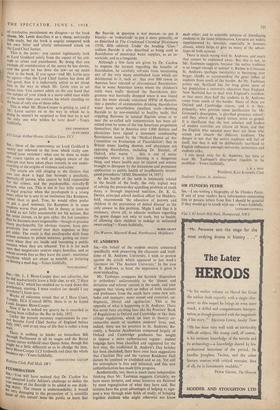SIR,—Most of the controversy on Lord Goddard is surely not
relevant to the issue which really con- cerned your reviewer : what can be done to make the courts (juries as well as judges) aware of the changes that have taken place recently in our under- standing of the origins of violence and crime. The courts are still clinging to the illusion that You can draw a legal line between a psychotic, mentally-ill person, who cannot be held responsible for his crimes, and the psychopathic, morally-fll person, who can. This is not in fact fully accepted in legal practice when the psychopath is a young man; often he is sent to an institution like Rampton, rather than to gaol. True, he would often prefer to get a gaol sentence, for Rampton is in some respects worse than gaol; but in theory at least he is held as not fully accountable for his actions. But for some reason, as he gets older, the law considers that he becomes more responsible—though in practice many psychopaths, for obvious reasons, have pro- gressively less control over their impulses as they get older. The result is that psychopaths drift from Prison sentence to prison sentence, getting no treat- ment when they are inside and becoming a public menace when they are released. Yet it is for such men that magistrates reserve angry homilies, and at whom crowds hiss as they leave the court: emotional reactions which are about as sensible as lecturing or hissing a mad dog.—YOurs faithfully,










































 Previous page
Previous page